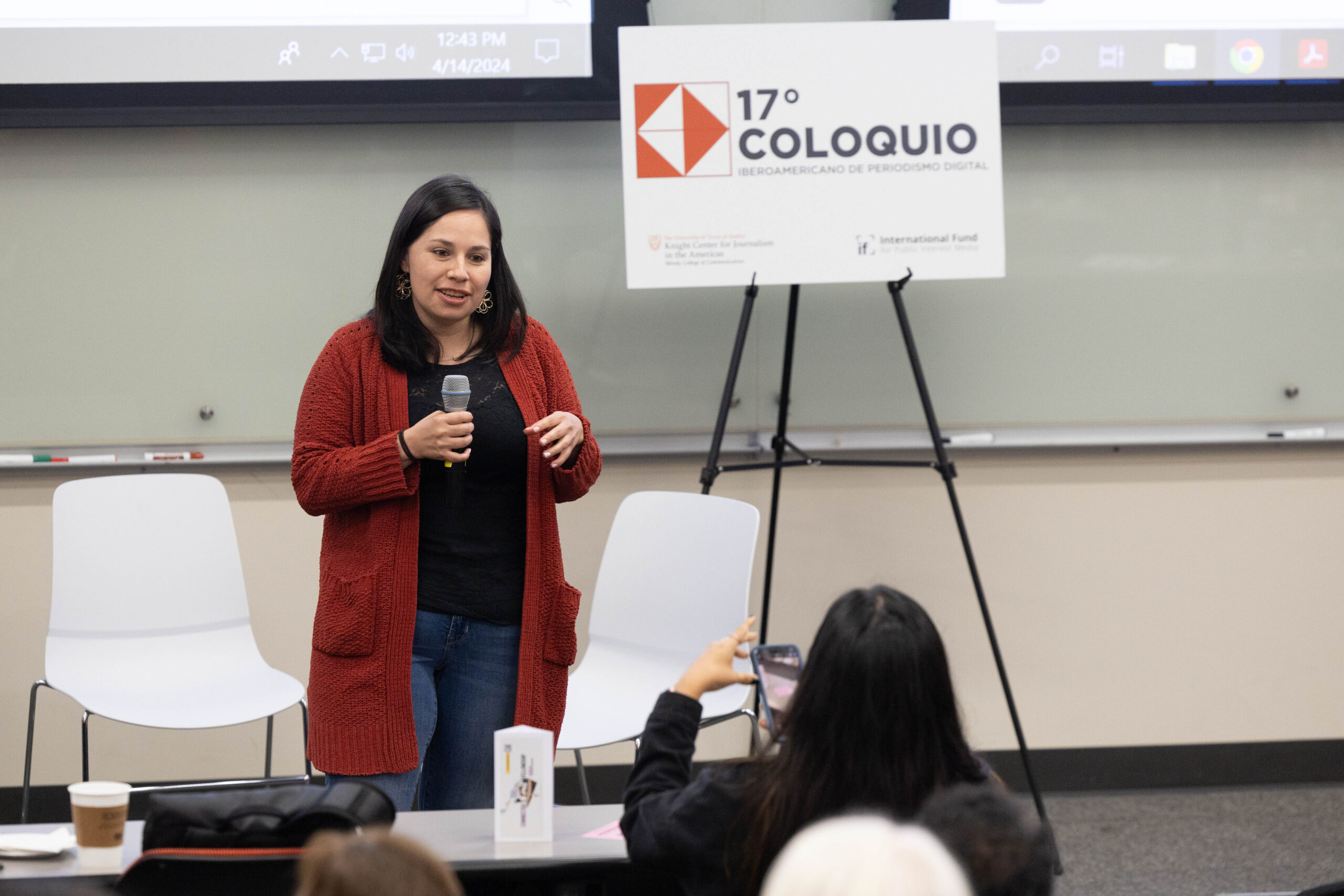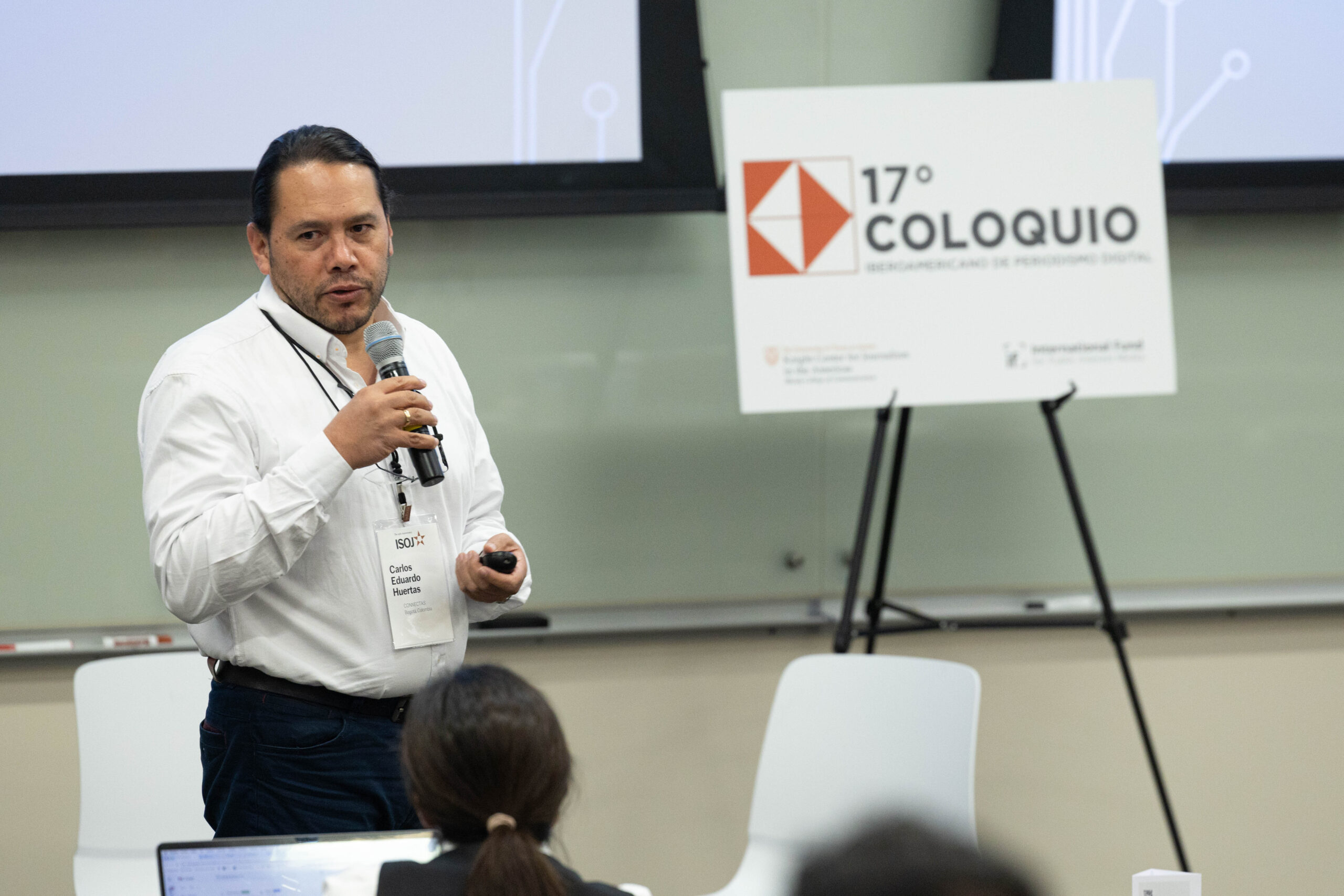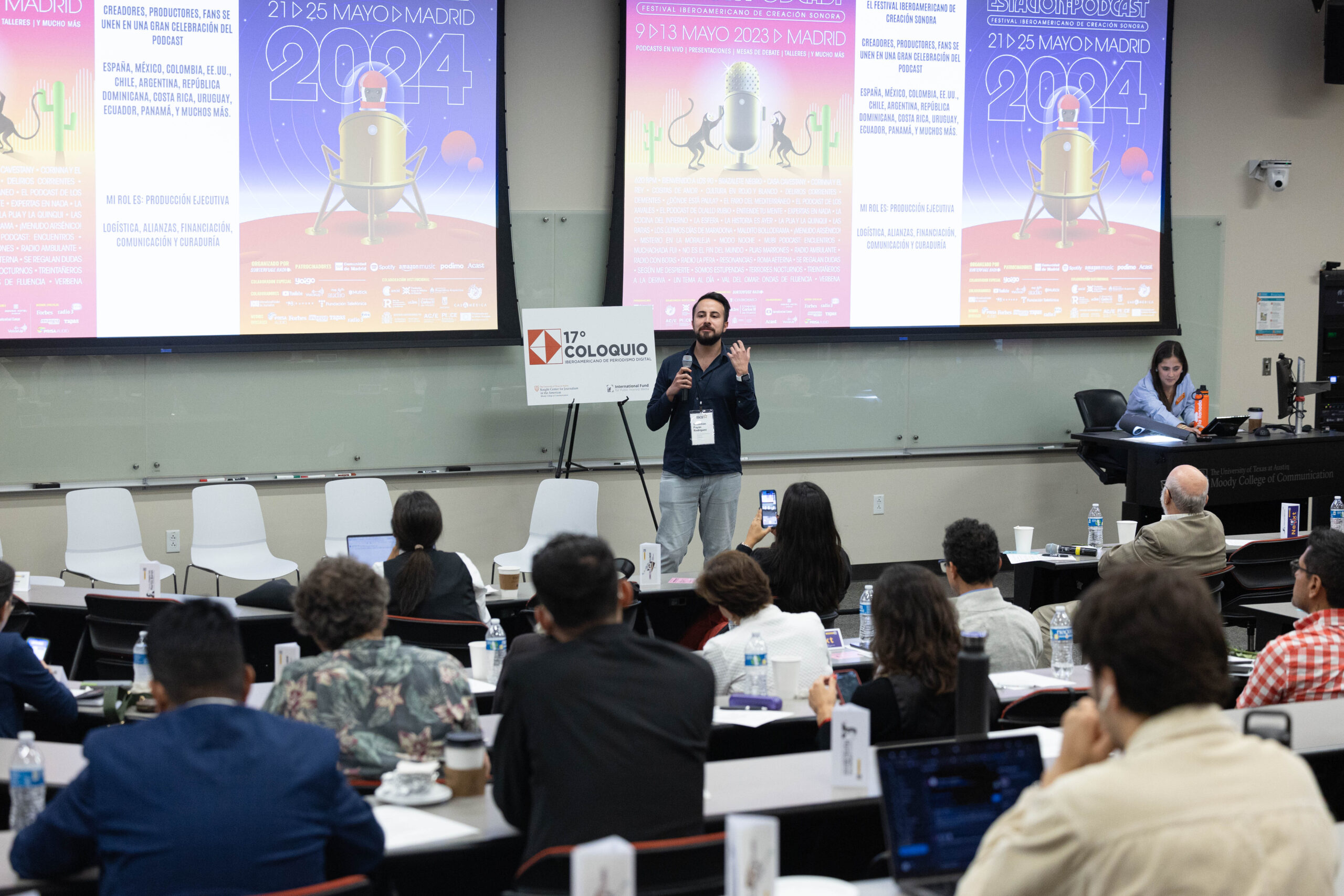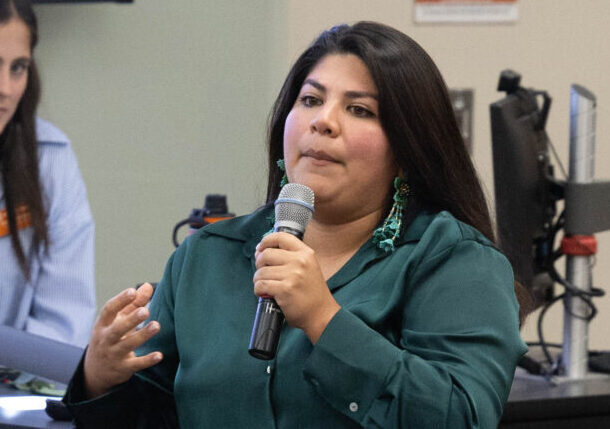The 17th Ibero-American Colloquium on Digital Journalism culminated on April 14 with a “lightning round” on innovative projects and press freedom in Latin America.
Through presentations of just five minutes, journalists from Argentina, Brazil, Peru, Ecuador, Panama, Colombia, Honduras and Cuba presented a series of projects that aim to keep journalism alive and to continue telling stories about Latin America.
The first to take the microphone was Ecuadoran Paola Lizeth Briceño Pazmino, co-founder of Clic Creativos, an agency specialized in digital communication and marketing.

Paola Briceño, from Ecuador, spoke about Virginia Cuenta, a podcast on women and economics that she produced with support from the International Center for Journalists (ICFJ). (Patricia Lim/Knight Center)
Despite not being a purely journalistic project, one of the focuses of the Clic Creativos team is to tell stories. For this reason, Briceño, together with the support of the International Center for Journalists (ICFJ), created Virginia Cuenta, a podcast about women and the economy.
“The podcast arose because I had been working on economic issues and I saw that the economy was very restricted for women. Women don't even know why we don't retire. Do you know why women don't retire? It is because we almost never reach the number of contributions required since we have to take care of the children, the grandmother, the uncle, etc.,” Briceño said. “Another issue I saw was because Indigenous women are almost not in science. So they are all those stories that I want to tell in this podcast,” she added.
The second participant in the lightning round was Audrey Cordova Rampant, founder of PUEBLO FILMS in Peru, an audiovisual production company that provides services to international channels.
But they not only produce content, they also provide editorial advice to avoid reproducing stereotypes about the Global South.
“In Peru, there is a very strong fracture between traditional television media and the population. That is also why we think there is an opportunity here to offer investigative documentaries to a population that is asking for it,” Cordova said.
In addition, she emphasized that they want the production company to become a safe space for women who work in the audiovisual area, who often suffer gender discrimination.
After Cordova's presentation, it was time for Natalia Estefany González Gil, digital literacy officer at CIVIX in Colombia.
González, being an educator by profession, has been in charge of weaving bridges between education and journalism or communication. The project she presented is called “Acción Cívica contra la desinformación” (Civic action against disinformation) and seeks, through digital and informational media education, to mitigate two major global risks: disinformation and polarization. The project is aimed at young people between 12 and 18 years old.
Journalistic organizations such as Fundación Gabo and Colombia Check collaborate with CIVIX in this project.
The next speaker was Argentine Nicolás Grossman, deputy project director of the Global Index on Responsible AI and the Open Data Barometer.
“We consider that if AI is not regulated correctly we run the risk of it enhancing the inequalities that already exist in our society. That is why we are promoting this global action to measure what each country is doing around responsible AI,” Grossman said.
“So we put together a multidimensional index that has three dimensions, 87 indicators, 29 themes and, in the next two years, we are going to collect more data around the world through our more than 150 researchers,” the journalist added.

Carlos Eduardo Huertas, director of CONNECTAS, talked about scholarships for journalists, programs for editors and a new project called Next. (Patricia Lim/Knight Center)
Then Carlos Eduardo Huertas, director of CONNECTAS, an organization that has supported investigative and collaborative journalism in the region, talked about its journalism scholarships for journalists, its programs for editors and a new project called Next.
“Given the death of newsrooms as a training space for new generations, we decided to design this new program called Next, which seeks to cultivate a new generation of young journalists,” Huertas said.
In this project, CONNECTAS, giving a financial contribution, will work alongsiode six media outlets so that they can link journalists under 25 to their newsrooms.
From Brazil, Thiago Medaglia, founder of Ambiental Media, spoke about the award-winning Aquazonia, a project whose objective is to place the Amazon waters at the center of the Brazilian political debate on rainforest conservation.
They are looking for alliances with media and organizations from other countries to cover this issue throughout the Amazon.
For his part, José Nieves, general editor of El Toque in Cuba, spoke about the challenges of having a newsroom spread across different countries around the world. He also talked about the Fundación Colectivo Más Voces.
“The Foundation serves for other media, other communication actors, who do not have legal status or do not have sufficient capacity to execute cooperation projects, can do so through us. We accompany them and also provide support in training and capacity-building programs,” Nieves said.
At the same time, he presented a project in which, through AI, they obtain currency exchange rates in Cuba and offer a calculator to their users.
Next, Sebastián Payán announced the third edition of the Estación Podcast festival, which will be held from May 21 to 25 in Madrid, Spain. The event, he said, aims to celebrate podcast creators and fans, while offering a space to think about how to improve that industry.
“It is an industry that has suffered very strong blows [...]. “It is an industry that is going through a very strange year,” said Payán, who is executive producer of the festival. “What we want is for this world map of the Latin American podcasts that are in the festival to be much bigger.”
Payán said that for this edition, the festival will have the support of the ICFJ to bring podcasts from Latin America that do not have the visibility of consolidated productions such as Radio Ambulante or Se Regalan Dudas, but that have the potential to generate an important impact on the podcast industry in the region.
Originally from Panama, journalist Dalia Elena Pichel spoke about the Observatorio de Femicidios (Femicide Observatory), created in November 2020 with the support of the ICFJ. This is a journalistic project that compiles official information on femicides in the country and compares it with journalistic reports to create a more extensive database and give visibility to the topic.
“It is a data-based journalistic project, the first observatory of its kind in Panama. Femicide was classified in our country in 2014, so at the moment there are 10 years of records,” Pichel said during her presentation.
The project is part of the Latin American Map of Femicide, which seeks to keep a real count of data on this crime throughout the region.

Colombian podcast producer Sebastián Payán announced the third edition of the Estación Podcast festival, to be held May 21-25 in Madrid, Spain. (Patricia Lim/Knight Center)
Pichel also spoke about Nueva Nación, the digital data journalism outlet where she works. She said that for the moment, in the context of the presidential elections that Panama will have on May 5 of this year, Nueva Nación is focused on electoral and financial coverage.
“The ecosystem right now, as in all our countries, is going through a crisis of credibility and we understand that there is a space for new media that provide journalistic rigor, that are based on data and that speak to young audiences, and perhaps not so young, in a different way, in which they feel identified with the brand,” she said. “Our goal is to strengthen democracy and transparency in Panama, democratizing information.”
Nueva Nación, which started as a newsletter and currently has a team of four people, relies on collaborations with established print and television media to reach more people, in exchange for providing data analysis, Pichel said.
Meanwhile, in Ecuador, the prison crisis facing the country has had extensive media coverage, but little is said about how this crisis affects women, diverse populations and children, said Ecuadorian journalist Thalíe Ponce, editorial director from the digital media outlet Indómita Media.
The journalist presented the special “The female face of the prison crisis in Ecuador,” made with funding from the Pulitzer Center, which so far consists of two reports on the topic with a gender focus.
“We have a deep security crisis, a prison crisis that is also linked to the escalation of violence, drug trafficking and corruption,” Ponce said.” “We cannot document this historical moment without talking about women and diversities.”
The journalist highlighted other work that Indómita has carried out, such as its research on how COVID-19 vaccines had effects on the menstrual cycles of menstruating people, or the
live fact-checking during the debates on abortion in cases of rape in the National Assembly of Ecuador.
Regarding social media projects, Juan Carlos Villacorta, co-founder of Infomercado, from Peru, talked about how his media outlet exponentially multiplied its number of followers on TikTok in just over a year.
In an attempt to remedy the drop in visits caused by changes in Google's algorithm after the pandemic, and at the same time reach younger audiences, Infomercado ventured into TikTok, first with short videos on various topics, and then with stories about entrepreneurship.
It was those videos about entrepreneurship that earned Infomercado the greatest growth in the vertical video social network.
“We decided to focus on a single niche, which was to tell stories of Peruvian startups, how they were born, how they grow. Tell stories of Peruvian companies that when they were small were ventures,” Villacorta said. “It was something that people were interested in and we had very rapid growth, from 5,000 to 50,000 followers in a very short time.”
A year later, after having published more than 150 entrepreneurship stories, at a rate of three per week, Infomercado has exceeded 300,000 followers. This growth has encouraged the media outlet to expand. Villacorta said they are considering also telling entrepreneurship stories from the rest of Latin America, as well as producing a podcast about entrepreneurs.
“Sponsorship opportunities have also begun to arrive and the community of entrepreneurs that follows us, who ask us to tell their stories, is getting bigger,” he said.

Journalist Telma Quiroz, from the Honduran media outlet Reportar sin Miedo, told how her newsroom practices diverse and participatory journalism. (Patricia Lim/Knight Center)
Also on the topic of digital platforms, Nico Russo, product manager of Argentine television channel El Nueve, presented SAOViVO, a free software that seeks to facilitate and optimize the distribution of video material generated by a newsroom.
The project, Russo said, arose from the monetization and copyright obstacles of uploading an entire television program to YouTube, which is why many networks choose to upload content divided into multiple clips. What SAOViVO does is generate a playlist with those clips and send them to YouTube as if it were a live stream.
The application, which was developed with support from the Google News Initiative, has the potential to be a boost for media sustainability, expanding audiences and reducing costs, he said.
“We are talking about how to invest money in the newsroom [...] rethink how we invest money to cover news,” Russo said. “And push the newsroom to make more original content, to cover more news from the surrounding community.”
All the innovations and journalistic projects presented at the Colloquium would not be possible if freedom of expression did not exist, said Ecuadorian journalist Christian Zurita, a National Endowment for Democracy fellow. During his presentation, the journalist spoke about the relationship between freedom of expression, media and the challenge this country faces in the fight against crime and corruption.
Although journalists like him and his colleague Fernando Villavicencio – who was assassinated in 2023 while running for the presidency of Ecuador – uncovered cases of corruption that led to the leadership of former President Rafael Correa's government being tried, the press ignored the infiltration of organized crime in the country.
Today, Zurita said, Ecuador faces a dramatic increase in violence and the effects of polarization. Furthermore, in recent years the Ecuadorian press has suffered the murder of at least four journalists and the exile of 10, including him.
“We are basically dedicated to establishing new processes of internal understanding within the press and finding new paths of security for journalistic work,” he said. “I hope to work on that in my fellowship at the National Endowment for Democracy.”
To close the Colloquium, Telma Quiroz, from the Honduran media outlet with a feminist and LGBTIQ+ focus Reportar Sin Miedo, told how they work to carry out investigations that impact the lives of those who read them through what she called “diverse and participatory journalism.”
As an example of this type of journalism, Quiroz spoke of a story they published about a young trans woman to whom the State had denied a scholarship that had been awarded to her as part of the measures to repair the damage caused by the murder of trans activist Vicky Hernandez. After the publication of the article and after the media outlet was the victim of a series of digital attacks as a result of it, the young woman was awarded the scholarship.
“We do not work with Google, but we do work with those people who are suffering every day from a State that violates them,” Quiroz said. “I like to think of journalism that is that, that is for the community.”
The Ibero-American Colloquium on Digital Journalism is an annual meeting of journalists from the region that is organized by the Knight Center for Journalism in the Americas. It is traditionally held the Sunday following the close of the International Symposium on Online Journalism (ISOJ) and this year was held on April 14. A recording of the Colloquium can be found here.